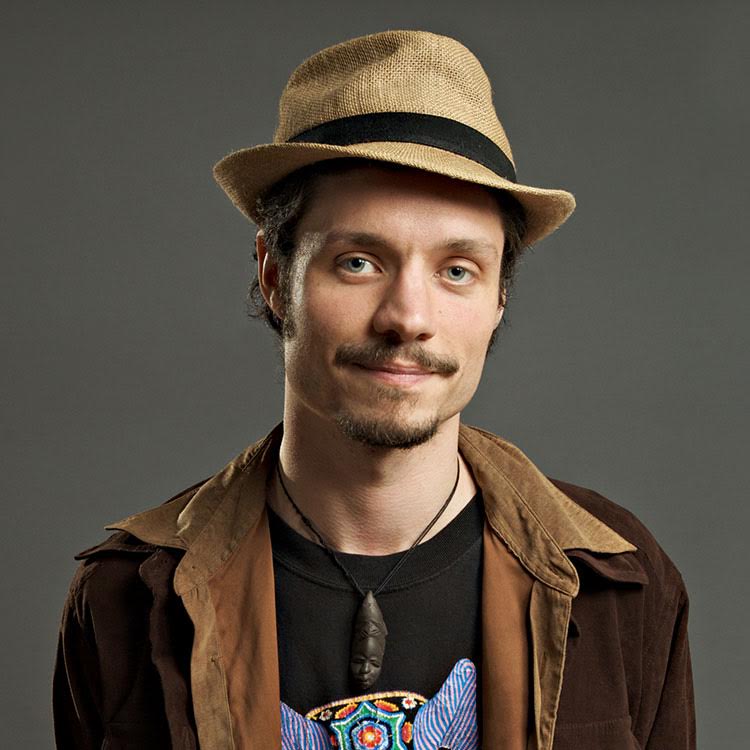During his 2019 commencement speech to Naropa University’s graduating class, which he dedicated to “The Great Mother, Mother Earth,” Dr. Travis Cox wept for the unsustainable state of the world. Soon after, Dr. Cox considered methods to incite the cultural shift we need, and he exuberantly claimed that at a recent conference, he had figured it out. Addressing the crowd of faculty members, students and families, Dr. Cox said: “Y’all should take psychedelics!” No shortage of applause followed.
Psychedelics have played a significant role in Dr. Cox’s life, and he has decided to be transparent about his perspective on their value because he believes they can help us shift from an unsustainable culture to a sustainable world. While practical action is crucial for this shift, it’s also essential to engage in the inner work necessary to transform our perspectives—and Dr. Cox does not shy away from discussing how psychedelics, and the synchronicity he experienced through them, helped pave his unlikely path to becoming a Naropa Board Member and Chair of the University’s Ecopsychology department.
I reached out to Dr. Cox to learn more about the power of psychedelics to initiate widespread change beyond the therapeutic container. What I received was the gift of a fascinating conversation with a kind, warm-hearted man whose despair over the state of the world is outmatched by his optimistic belief in the triumph of the human spirit.
We were discussing that we’re in a “post-truth” society. Amazing that this is an accurate description of reality these days.
I know! I recently read an article in The Atlantic explaining that Trump has spent more money spreading disinformation on Facebook than all of the Democratic candidates combined. It gets to the end of the article, and there’s this great line that says something like, “It’s not a battle for the soul of American politics. It’s a battle for reality itself.” We can’t even have a conversation about what’s real anymore because of purposeful disinformation. Our analysis has to go down to metaphysics, our basic assumptions about the nature of reality. Hannah Arendt talked about fascism back in the day, and essentially anticipated that fascism would evolve to the point where it would colonize reality.
Yeah, why would it stop at the governmental level when it can keep going into the abstract?
Right. Steve Bilko, an anti-Apartheid activist, said, “The best weapon in the hand of the oppressor is the mind of the oppressed.” You don’t have to put people in cages; they put themselves in cages.
Bill Plotkin, who did his PhD in Psychology at University of Colorado and also practiced wilderness therapy, says that in an unsustainable society, our primary addiction is to our worldview. That’s the best intersection for me in terms of trying to understand why this is happening and why we aren’t stopping it—because we’re addicted to this worldview of scientific materialism, capitalism, consumption—these basic assumptions of how we get knowledge and how humans relate to each other. So what do we do about that?
You say “our worldview.” It’s interesting to think of that in post-truth times, because wouldn’t that imply a consensus reality?
This is the kind of debate I got into with some of my dissertation professors. They would say what you said, that it’s very monolithic. But every worldview has an ontology, an epistemology, an anthropology, a sociology. Those will be the assumptions. A Western ontology is usually biblical to a certain extent: Human beings are fallen and sinful, and there needs to be redemption—as opposed to a Buddhist ontology, which recognizes the inherent goodness in all things. Completely different social structures emerge from those basic assumptions. Politically in America, there is seemingly a ton of difference, but at the same time, some of those basic assumptions are the same, even when the politics are not.
There’s still a fundamental ontology.
Right. Scientific materialism exists, whether it’s conservatives or liberals.
So then with climate change, we’re using the paradigm that created the problem to try to solve the problem.
Right! There’s this debate with psychedelics that genuinely interests me. Some people believe that something inherent in psychedelics birthed the hippie generation, right? Someone like Rick Strassman, though, says that’s not true. He thinks of them in the way Stan Grof thinks of them, as “non-specific amplifiers.” I’m open to that being a possibility, in the sense that there’s nothing inherent in psychedelics that lends itself to an ecological or spiritual worldview. But that just means we need to have a conversation and create arguments for why those are good worldviews in the first place. And that doesn’t change the fact that psychedelics can help you move from whatever worldview you’re in to a new worldview.
So instead of seeing psychedelics as a prime mover, you see that the worldview is already there, and psychedelics amplify it. For example, there was unrest in the hippie generation, and then LSD came around—I think of Ken Kesey on top of the Furthur bus with a megaphone, amplifying something that was already there.
To me, it doesn’t dismiss the efficacy of psychedelics for a cultural shift. It means that we have to outline the cultural shift when we use them as tools to make that shift—though I’m still of the opinion that there’s something inherent in the experience itself that lends itself toward this cultural shift.
When you say “this cultural shift,” you’re referring to—
Moving from unsustainability to sustainability. Survival. The way that I think about sustainability is now through the lens of Ecopsychology: we are disconnected from our true selves. You don’t go to college anymore to figure out who you are; you go to get a job in order to be a consumer. It doesn’t matter what you want to do. This is what the economy needs, and you’re going to get compensated, so you do it.
To me, the shift from unsustainability to sustainability—and this is one of the assumptions in my worldview—is that the thing you’re most passionate about, as long as it’s life-giving for you and for the world, is what the world needs. You’re passionate about it because the world is trying to bring out something it needs through you. So we’re disconnected from ourselves, we’re disconnected from each other, we’re disconnected from Spirit, and we’re disconnected from nature. Psychedelics have something to do with all of those things.
I felt those things in a peyote experience this past weekend. It was self-affirming, in that I felt this profound strength inside me, but it felt like that strength was from a source outside me, and it was essential that I bring it forward. It was like the peyote was saying, “This is what’s needed, and this is inside you, and you cloud it with your silly narratives about how you should be small. But this is what being human is.”
Tell me more about your peyote experience. What was the setting like?
It was a half-moon ceremony through the Native American Church, but done in a living room instead of a tipi because it’s winter. There was a fire going the whole time. They made an altar in the middle of the room where the Fireman placed embers and shaped them into different symbols, like the half moon. We sat in a circle. We smoked tobacco and spoke prayers, and then passed the medicine around. Rattles and a drum went around the circle, and people led songs. There were several cycles of that, and there were points where the leaders spoke to the elements and to various themes present. The group intention was love, so love filtered through everything. Have you done it?
Yes. My experience of it was that I never had a cultural context for any of my medicine work prior to peyote, other than in college when it was like, “Hey, we’re camping, we should eat some mushrooms!” So having a cultural context was really cool—and problematic, probably. But for me, I’m just grateful to have this conversation on cultural appropriation. I’ve been in spaces where that conversation can be challenging, especially for white fragility. But even the non-dominant culture says that the medicine fixes you. So people in the dominant culture do the medicine, and then as a result it’s as if we become more open to having the challenging conversations. Again, is this because of the medicine itself?
I had that experience last semester during my Social and Multicultural Foundations course, which was bringing up lots of feelings related to white fragility. When I underwent a 3.5 gram mushroom journey with eyeshades and music, it completely transformed my perspective. I saw the way my ego was playing into the conversation, I heard the collective trauma from a broader vantage point, and I showed up differently for the rest of the semester.
For me, I grew up in a white supremacist, techno-capitalist culture, and I don’t want to give in to that. So what are my options? I have German heritage, so should I go back to Germany? That doesn’t make a whole lot of sense. Then it’s like: I’m living in Colorado, so do I study Ute culture? No, because that’s cultural appropriation. So, okay, then let’s just have a conversation on what the hell I’m supposed to do! I don’t want to make anybody mad, but I don’t know where my next move is. So I just appreciate that psychedelics let us have this conversation in a different way.
Do you have hope in a sustainable culture? Like, on this planet?
…
I should say, I feel that you have hope. But is it a practical possibility?
Is it technically feasible? Yes! Of course it is. What are the chances? I don’t know.
Speaking of trauma and altered states of consciousness, I just started going back to my therapist, whom I found after my Mom had passed.. I held my mother’s hand in the Emergency Room and asked her to leave this world. They had brought her back and lost her about five times, and they said, “You should just ask her to go.” So I did. She was 62. I reached out to this therapist again because in the last year and a half, I’ve had these kind of manic swings between, “Oh my gosh, it’s all possible!” to “There’s no way this can happen.”
So the work I’m trying to do right now is realizing I’ve been put in every position by Spirit—the shorthand I’ll use for it—like finding my way to CIIS, where Stan Grof was one of my professors. That was not a rational choice. It was a Dark Night of the Soul that led me there. Then it was a series of synchronicities that led me to Iowa State, and then a spiritual experience that my wife and I had that led us to come here to Boulder. I have this faith in Spirit to put me where I need to be, so why don’t I have faith that this same Spirit is working itself out in larger ways? I don’t have an answer. I’m trying to figure it out.
Do you think there’s a particular degree of participation that has to happen for that alignment? An assumption of my worldview is that we can resist Spirit’s movement. Maybe that’s not true, but it seems the more I open myself to recognizing synchronicity, the more it happens.
Again, that brings us back to psychedelics. Why is it that you can do one activity on a day when you’re sober and have nothing happen, and the next day do the same thing on a little bit of mushrooms, and it’s objectively the weirdest fucking thing? Is there a way that those substances align you with Spirit? One of the crazy things about my experience with peyote was that for a month afterwards, I was in a constant flow of synchronicity. Like, constant. It was like, “Of course you would say that, cause I was just talking about it,” or, “Of course this book just arrived from a friend, because somebody just told me about it two days ago.” It lessened, but it continued strongly for about three months.
Are we advocating that everyone should just be on mushrooms all the time? No. It’s stupid for anybody to ascribe that to us, and yet I feel like just because I’m talking about it, people assume I must trip all the time, that I’m this second coming of Leary who wants to dose the water supply because that’s how I’m going to start the revolution. No!
One of my students, Azul, loves quoting Alan Watts: Once you get the message, you can hang up the phone. Yeah, the peyote ceremony was great, but I had no desire to do it for a year. And even when the year anniversary came up, and other people did it again, I didn’t. That isn’t to discount the enormous benefit I received. The whole point is that I was able to internalize and use the benefit I got, so I didn’t need to do it again.
But that’s me in my process and the intention I have around it. You and I were talking earlier about how we used to unconsciously use these medicines. I use them consciously now. There’s a way in which that’s going from zero to one—I was unconscious, and now I’m going to be present, do a ritual, set and setting, all of that. This isn’t to say that there isn’t somebody who needs to do it every month to work through whatever shit they’re working through.
A lot of white male undergraduates I know just got high through all of college. One of the exciting things is that when we start to bring consciousness and awareness to psychedelics, and especially to frameworks or ways of understanding them, it’s like this whole world is opening that hasn’t been present for generations, or maybe at all in our culture.
Part of my worldview since reading Nietzsche is that we’re in a spiritual crisis, a lack of meaning: “God is dead. And we killed him.” I think much of our mental illness comes from that and is ingrained in solipsism, this lack of connection not only to one another, but to the Cosmos. I’m not sure if psychedelics alone is responsible for that connection, because I was also looking for it when I found it.
If there’s something inherent in psychedelics that lends itself to transforming our worldview, then that’s fantastic. But even if they are non-specific amplifiers as Strassman and Grof say, they’re still tools in the toolbox to help us do this. So, when you’re asking me if I have hope, I have more hope if there’s something inherent in psychedelics that moves people that way. Because if there isn’t, then we have to articulate what it is we’re wanting people to move into, and why it’s necessary.
Regardless, even if they are just non-specific amplifiers, there’s a synchronicity around how we are in an insanely polemical situation right now, at the same time psychedelics are gaining exposure. I’m thinking of Pollan’s book. Pollan’s book was interesting for me because I feel like he tried to argue that there isn’t a “psychedelic” worldview. But I think he was predisposed to think there wasn’t one anyway, and then was looking for evidence to prove it.
He’s still in his own echo chamber.
He is. I mean, he’s an avowed scientific materialist, and so it was awesome that he even wrote the book. But one thing I found interesting is that he often invokes studies where scientists were trying to figure out the properties of the substances—do they mimic psychosis? Are they mind-manifesting? They would design these experiments to try to prove one of those things, like, “Okay, we’re going to try to design an experiment whereby the people to whom we administer will have an experience that mimics psychosis, because it’s a psychomimetic substance.” But then many people would say, “Actually, that was the best experience of my life!”
So then it can’t just be a non-specific amplifier if the whole point of the experiment was to induce psychosis, and yet these people had the opposite experience: they had clarity. That’s something inherent in the medicine, right? It isn’t just, “Here’s the context. Now I’m going to give you this, and it’s going to be a bigger context.” They said, “Here’s the context,” and then people had experiences outside of that context.
So I still have hope that there’s something inherent in psychedelics that moves us in the ways we need. Here are things that at best help us move in the right direction, and at worst knock people out of their ruts. Even if it’s just knocking us out of the ruts, as long as we have something to move into, we’re making way more progress than if we don’t have anything to knock people out of the ruts in the first place.











